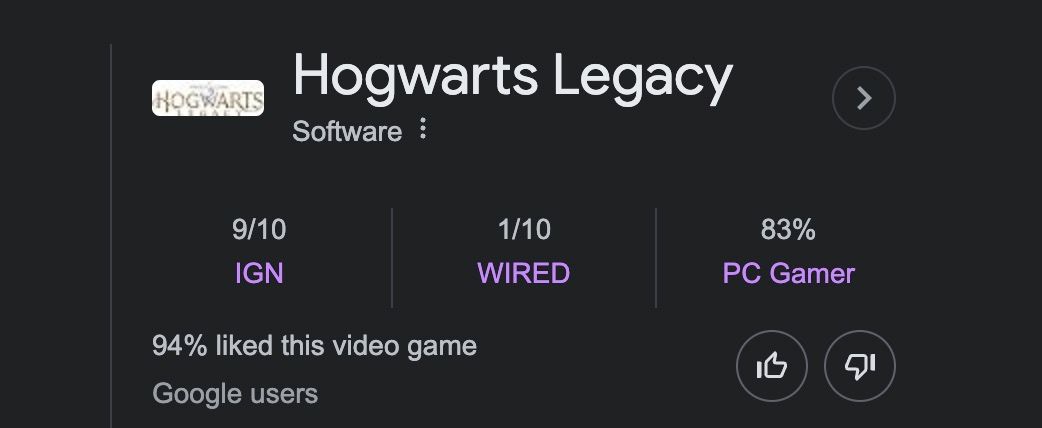
Peeling Back Pages: Discerning Truth From Game Ratings

Peeling Back Pages: Discerning Truth From Game Ratings
Reviews are important metrics for products because they help us decide what to pick when there are so many options out there. This logic still applies to video games—especially because there are many games to choose from.
But should you always trust game reviews? Even when they come from major names like IGN or Games Radar? No, not really. And we’ve detailed why you should use your own judgment before swallowing a game review hook, line, and sinker.
Disclaimer: This post includes affiliate links
If you click on a link and make a purchase, I may receive a commission at no extra cost to you.
1. Reviewers Can Approach the Review With Bias
Bias is human, and reviewers are human. While most good reviewers try their best to make sure their personal preferences don’t show when making reviews, it’s something not even the best reviewers can help.
Take Hogwarts Legacy, for instance; IGN gave it a 9/10, PC Gamer gave it an 83/100, and Wired gave it 1/10, essentially saying the game isn’t even worth picking up due to anti-Semitic tropes, bad graphics, and flat storytelling. But how can a game acclaimed by other strong reviewers be virtually unplayable to another?

The bottom line is that opinions, political stances, and backgrounds matter a lot when it comes to something as subjective as reviews. Do not completely trust any review you read.
2. Some Groups of People Review-Bomb Games
Review-bombing is when a large number of people collectively give something bad reviews for reasons that don’t correspond to the quality of the product itself. For games, it’s usually an external factor like news concerning the game developers or controversy that prompts such actions as a form of “social justice.”
A famous example of this was when Camp Santo filed aDMCA takedown of PewDiePie’s Firewatch content in 2017. PewDiePie’s fanbase wasn’t happy about it and decided to retaliate by review-bombing Firewatch on Steam.
The result of such actions is that unassuming potential buyers could get dissuaded from buying a game purely because of a group’s spite. You can avoid falling into that trap if you are skeptical about game reviews.
3. Early Impressions Can Be Misleading

Image Credit:CD Projekt Red
Most major game reviewing platforms like to give game reviews as early as possible to set the trend for the game’s reception. However, the problem here is that time can really change the way a game is perceived.
Cyberpunk 2077 was a highly anticipated game from CD Projekt Red (developers of The Witcher 3). However, many gamers reported bugs and performance issues when it was released in 2020. This was the core reason for many of its bad reviews on Metacritic.
Since 2020, Cyberpunk 2077 has received several patches that have optimized it. It runs a lot better now on the PS4 and Xbox One. You would be wrong if you judged it based solely on Metacritic’s old assessment.
Besides developers literally improving games with updates, some games age quite nicely. And thanks tocommunity-created mods , you can improve some games the way you like.
4. Game Studios Sometimes Encourage False Reviews

While it’s generally frowned upon as bad marketing practice, some studios pay reviewers to give them positive reviews. The issue with doing this is that it could be difficult to tell when a reviewer is genuine, or they have taken some money under the table.
We can’t name names for obvious reasons, but you should be extra careful when basing your gaming decision on reviews. Stick to watching or reading reviewers you know have a history of stoic integrity.
In some cases, you might gain more from a criticism made by a not-so-popular reviewer. They are less likely to be approached by big studios, and they will mostly be speaking based on personal interest and nothing as sinister as deceptive capitalism.
5. Reviewers Sometimes Have Tight Time Constraints

The world of game reviews and media is a cutthroat world based on views and attention. Anyone who gets their stuff out early will get the most traction because they’re sharing new and exclusive information.
This can put a lot of pressure on reviewers as they strive to speed-run games to come up with a “comprehensive review.” Even the most faithful gamers might not properly appreciate a game if they had to rush it for work.
For this reason, you should be extra wary of early reviews. They might not properly capture the game by virtue of the fact that the critic might have rushed it.
Make Your Own Assessment of Games
We aren’t saying reviews are useless, but you can now see how fallible they are. It’s a great way to gain insight into other people’s feelings toward a game. In conjunction with reviews, you should assess video games by playing a demo or watching a gameplay video. Those will set more realistic expectations and give you a more direct experience with the game.
Also read:
- [New] 2024 Approved Navigating the World of Drone Races & Top FPV Choices
- [New] JokeJigsaw MemeMakerMecca
- [Updated] In 2024, Best of the Best Trivia Channels
- Console Wars: PS+ Versus Xbox Game Pass
- Cross-Platform Use for PS5 with PS4?
- Discovering Hidden Gems: Indie Game Search Tips
- In 2024, 9 Mind-Blowing Tricks to Hatch Eggs in Pokemon Go Without Walking On Nokia 130 Music | Dr.fone
- Maximize Your Console's Capabilities Using a Laptop as Monitor
- New Say Goodbye to Shaky Footage 8 Free Online Video Stabilization Solutions
- Steering Clear of Signal Shadows on Your Pokémon Go Quest
- Top 7 Optimal Cell Phone Contracts for Seniors
- Title: Peeling Back Pages: Discerning Truth From Game Ratings
- Author: William
- Created at : 2024-10-22 16:46:36
- Updated at : 2024-10-25 06:04:43
- Link: https://games-able.techidaily.com/peeling-back-pages-discerning-truth-from-game-ratings/
- License: This work is licensed under CC BY-NC-SA 4.0.